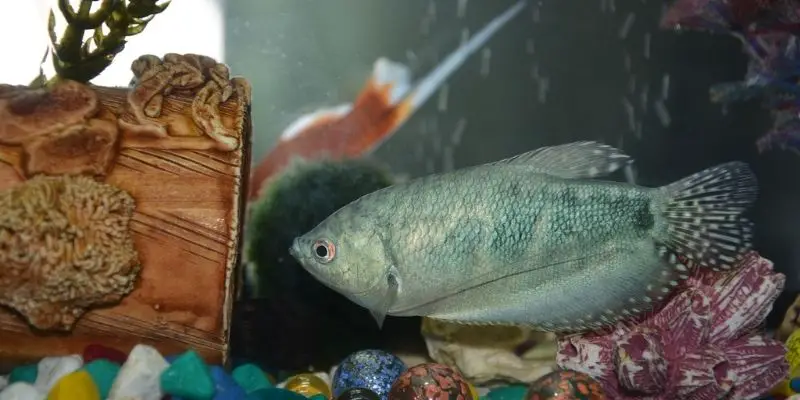Dwarf gouramis are beautiful fish that can make a great addition to any tank. But what do you do if your dwarf gourami isn’t swimming? This can be a cause for concern, but in most cases, it is nothing to worry about.
Keep reading to learn more about why your dwarf gourami might not be swimming and what you can do to help get them back into the water!
Why Is Dwarf Gourami Not Swimming?
There are a handful of reasons why your dwarf gourami might not be swimming. They could be resting for any number of reasons, or they may even be sick and struggling to swim. In either case, you want to do what you can to help them get back into the water.
Is It Sleeping?
One of the most common reasons why a dwarf gourami is not swimming is because they are sleeping! Dwarf gouramis have a natural tendency to sleep on plants and other parts of their environment at night time. This is normal behavior for them but can be confusing when you notice it.
If your dwarf gourami has stopped swimming and is instead sleeping on the bottom of the tank or somewhere else in its environment, then there is no need to worry! Dwarf gouramis are not very active fish in general, so if they aren’t moving and aren’t active, there is a good chance that they are sleeping.
If you would rather be certain that your dwarf gourami is asleep and not sick or injured, try darkening the room that your fish tank is located in at night time. This will trigger their instinct to sleep. If they continue to sleep through the night and aren’t acting sick in any way, then there is a good chance that they were just sleeping.
If your dwarf gourami wakes up during the night and starts swimming around or acting normally, then chances are they were resting or sleeping because of stress or other factors. While this could still be nothing to worry about, it is best to take some precautions to make sure your gourami is safe and healthy.
Check the Water Conditions
Another reason why a dwarf gourami might not be swimming or staying at the top of the water is because they are stressed out! Dwarf gouramis do best in water that has been well-filtered and which maintains a proper pH level. If the water in your tank is dirty or has a low pH, then this can cause dwarf gouramis to become stressed out and not swim.
In addition to checking the water conditions in your tank, try doing a partial water change. The larger the water changes, the better! If you can’t do a full 50 percent or more water change, then try replacing 10 – 15 percent of your tank’s water at least once a week. This will help improve the overall quality of the water and give your dwarf gourami some relief from their stress.
If you notice that your tank’s water is dirty and the pH level isn’t right after doing a partial water change, then it may be time for a full tank cleaning and filter replacement. When the quality of the water in your fish tank changes drastically due to high ammonia or nitrite levels, then your fish are likely to become stressed.
If the water in your tank is dirty and does not have enough dissolved oxygen, this can cause stress in dwarf gouramis. If you notice that your tank’s water is dirty or contains high ammonia or nitrite levels after doing a small water change, it may be time for a more thorough cleaning job.
Make sure to give your fish some time to adjust to the new water conditions before expecting them to start swimming around normally again!
Is Your Gourami Sick?
In addition to being stressed, another common reason why dwarf gourami may not be swimming is that they are sick. Sick dwarf gouramis may stay on the bottom of their tank and not swim around.
In some cases, dwarf gouramis may seem to be swimming fine at first, but then they will begin to struggle to stay afloat. If you notice your dwarf gourami having trouble staying out of the bottom half of the fish tank, then it is time for a trip to the vet.
Some medications can treat many of the illnesses and diseases that affect dwarf gouramis, so it is important to get a proper diagnosis from a fish tank expert as soon as you notice your fish acting abnormally.
In addition, if you have other fish in your tank who seem to be doing fine, then it is unlikely that the problem is contagious. Be sure to quarantine your dwarf gourami before taking them to a fish expert!
Dwarf Gouramis Need Time To Adjust
Another reason why dwarf gouramis may not be swimming around or staying on top of the water is that they are stressed out. As stated before, dwarf gouramis do best in water that is clean and maintains a healthy pH level.
When setting up a new fish tank or getting your tank ready for the first time, it can take some time for the water to reach an acceptable and stable condition. As such, make sure to give your fish some extra time to adjust to their new tank before expecting them to start swimming around normally.
In general, it is best to wait a week or more before doing anything drastic with your fish tank. In some cases, you may not be able to see the effects of a water change for up to two weeks after performing it! With this in mind, make sure that you only change around 10 – 15 percent of your fish tank’s water at a time.
If you notice that your tank needs to be changed, but it has only been one or two days since the last water change, try not to do too many more changes. It may seem easy to just keep adding clean water every day so that you can quickly fix the issue, but these continuous water changes can actually be quite stressful for your fish!
Instead, try to make sure that you are doing partial water changes once a week. This will give your dwarf gourami enough time to adjust to their new environment without being stressed out too often.
What To Do Next
If you have tried all of the tips above, but your dwarf gourami is still not swimming or staying near the surface of the fish tank, then it’s time to take them to the vet. Some medications can treat many different diseases and illnesses in dwarf gouramis, so it is important to find out what is wrong with your fish before doing anything drastic.
In addition to giving your dwarf gourami a proper diagnosis, a fish expert can also tell you if the problem is contagious or not. In some cases, it may be best to quarantine your dwarf gourami before taking them in for treatment.
With that being said, quarantining sick dwarf gourami should only be done if you have another healthy fish in the tank. If there are no other fish to keep your gourami company, then it’s best not to take this route.
If you choose to quarantine your sick dwarf gourami, be sure to wait at least three weeks before bringing them back out into the general population. This helps ensure that your whole fish tank will stay disease-free and healthy long-term.
Now that you know what to do if your dwarf gourami is not swimming around, it’s time to learn how to help them when they are sick!

